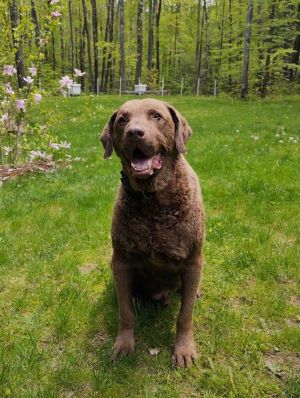A Fighting Chance Against Hemangiosarcoma
Ruger was adopted as a puppy and grew up living the ideal retriever life with his human family. A typical Chesapeake Bay Retriever, he was loyal to his people and enjoyed being active with them. Ruger was also a devoted friend to his owner and duck hunting partner, Bryan. Because of their close relationship, Bryan knew something was wrong the day Ruger wouldn’t take a treat or come into the house after working in the garden together. He was lethargic and his gums were pale. Ruger was rushed to Cummings Veterinary Medical Center at Tufts University where Bryan knew he would receive the advanced emergency care he needed. Ruger was diagnosed with internal bleeding and had exploratory abdominal surgery to remove his spleen which contained a ruptured softball-sized tumor. It was hemangiosarcoma.

Ruger and Bryan’s story up until this point is familiar to many dog owners and veterinary professionals. Hemangiosarcoma is an aggressive cancer of the cells that line canine blood vessels. It most commonly affects the spleen and heart, although other organs, including the skin, can be affected. When it affects internal organs, hemangiosarcoma often grows undetected until the tumor ruptures, causing life-threatening blood loss. Emergency surgery is required to remove the tumor (if possible) and stop the bleeding. Chemotherapy is often given following surgery to slow the spread of the cancerous cells throughout the body (metastasis). Unfortunately, the average survival time following surgery and chemotherapy is only 5-7 months.
Ruger is not an average dog.
Following surgery, Cheryl London, DVM, PhD contacted Bryan with news that Ruger qualified to participate in a clinical trial being conducted at Cummings Veterinary Medical Center and supported by AKC Canine Health Foundation (CHF) funding. The “Improving Outcomes for Dogs with Hemangiosarcoma” trial has three goals:
-
develop a blood test for early detection of hemangiosarcoma,
-
characterize the genetic changes in cancer cells that drive treatment resistance,
-
and develop a better way to monitor response to standard chemotherapy with doxorubicin.
Bryan did some research and decided to enroll Ruger in the clinical trial. The main reasons he did so were the financial assistance provided for Ruger’s chemotherapy and the knowledge that if this research could find a way to detect hemangiosarcoma sooner, in some small way, he could help other dog owners avoid the scary emergency situation he faced with Ruger.
Ruger received chemotherapy at Cummings Veterinary Medical Center along with routine screenings of his heart (doxorubicin can be toxic to heart muscle cells over time). He had chest x-rays to monitor for metastasis and blood tests to monitor his overall health. Ruger finished his chemotherapy in late 2020 and now only visits Dr. London and her colleagues for monthly check-ups. Remarkably, at ten years of age and over a year after his hemangiosarcoma diagnosis, Ruger shows no evidence of cancer spread and remains an active family member – although his hunting activities have been modified due to his age.
“I was unfamiliar with clinical health research for dogs and the foundations that are supporting it,” says Bryan. “I hate to think that someone would have to euthanize their dog because they couldn’t afford treatment, so the financial assistance provided by these trials is important. Plus, the translational value of this research – knowing that it can also help humans – is remarkable.”
Dr. London’s current CHF-funded study (Grant 02510-T: Identification of Novel Synthetic Lethal Partners to Optimize PI3K Targeted Therapies in Canine Hemangiosarcoma) seeks to characterize genetic mutations that activate a biochemical pathway used by many cancers such as hemangiosarcoma. Results will help identify treatment targets and be used to design future clinical trials.
"We see patients whose owners worry they have few options for their canine companion diagnosed with a devastating disease,” Dr. London says. “The ability to enroll them in a clinical trial in a familiar environment gives them comfort and hope. This study advances the science as we work to improve treatments and outcomes for dogs."
Bryan is grateful for the care and assistance he and Ruger received from the team at Cummings Veterinary Medical Center and wants other dog owners to know how beneficial it is to participate in clinical research. “We can’t find a cure if no one participates,” he says. “And don’t worry that your dog will be part of a sterile science experiment. Ruger received better care in this clinical trial than he would have otherwise. The team at Tufts answered all of my questions and really cared about my dog.”
The AKC Canine Health Foundation and its donors have invested more than $15.4 million in canine cancer research including clinical trials like the one that helped Ruger. These studies rely on dog owners like you to support and participate in canine health research that advances our knowledge of cancer so that veterinarians can diagnose it earlier and treat it more effectively. Visit akcchf.org/caninecancer to learn more about CHF’s canine cancer research and search for cancer studies recruiting patients or samples. Working together, we can give all dogs a fighting chance against cancers like hemangiosarcoma!
Thank you to the dogs, owners, researchers, and veterinary professionals that participate in clinical trials to help all dogs live longer, healthier lives.
Related Articles
- What Factors Influence Client Decision-Making and Clinical Outcomes for Dogs with Non-Traumatic Hemoabdomen? (04/11/2024)
- Cancer Attributable to Infection? (06/08/2022)
- Effie's Tale (07/01/2021)
Help Future Generations of Dogs
Participate in canine health research by providing samples or by enrolling in a clinical trial. Samples are needed from healthy dogs and dogs affected by specific diseases.



